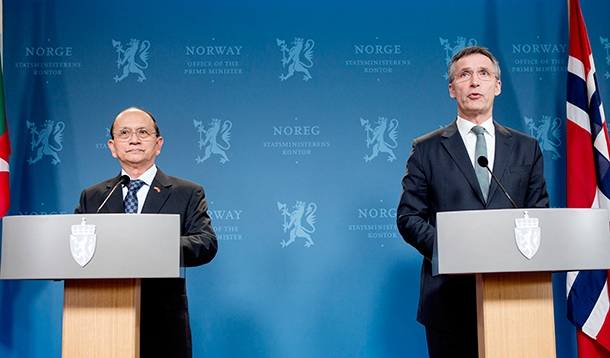The relevance of the Myanmar Peace Support Initiative (MPSI) is being reviewed two years after Norway spent US$2 million on dozens of development and aid projects in Burma’s ethnic conflict areas, the initiative’s director said.
“We are trying to see whether what the MPSI has been doing for two years is still as important and still relevant today,” Charles Petrie, who heads the MPSI, said in an interview in Chiang Mai, northern Thailand.
“MPSI peace-related support might be no longer needed,” he said, adding that the project could be renamed and offer a different type of support to the peace process.
“What we are doing right now is reviewing what the MPSI has done,” he said, before adding, “I didn’t say that the MPSI is going to end.” Petrie said MPSI had spent about $2 million in the last two years.
The Norway-funded initiative began in January 2012 with the aim of supporting the peace process that was started by President Thein Sein’s reformist government and has resulted in the signing of more a dozen ceasefire agreements with ethnic armed groups in the past two years.
The MPSI launched dozens of pilot projects in Burma’s ethnic border areas, such as in Shan, Karen, Karenni, Mon, Chin states as well as Pegu and Tenasserim divisions. The projects focused on humanitarian aid, education support, development and the possible return of internally displaced people (IDPs) and refugees. Some 60,000 IDPs were issued national identity card with the support of MPSI, which also held consultations and workshops in ethnic areas.
The initiative funded projects by international organizations such as Norwegian People Aid, Norwegian Refugee Committee, the International Labor Organization and local relief groups, such as the Committee for Internally Displaced Karen People.
However, some Burmese and ethnic community-based organizations (CBOs) working with conflict-affected ethnic groups and refugees in Thailand have criticized the Norway-led initiative. The groups said it lacks transparency, fails to consult CBOs, and risks channeling aid into conflict areas before Naypyidaw and ethnic armed groups have reached a political settlement to end their long-running conflicts.
Currently, the government and the ethnic rebels are trying to consolidate their ceasefire agreements; the sides are due to hold a second round of talks next month in Karen State capital Hpa-an to discuss the signing of a nationwide ceasefire agreement.
Petrie said the MPSI had been launched early on in the peace process in order “to test whether the commitments made by the government were real commitments, and to help the armed groups test those commitments.”
“We have a number of pilot projects … of 100,000 and 150,000 dollars. And they are basically a type of relief supports. They were used to test how the authorities and the IDPs can get along,” he said.
“Today, I think the situation is very different. You have ceasefires. It is very clear that the [ceasefire] process is serious,” Petrie said, adding that a review of the MPSI would be completed in February to assess whether its approach remains relevant.
Petrie said the project could change its name and offer other, scaled-down forms of support that would focus on new political structures that are likely to be created as a result of the peace process. The initiative might, for instance, focus on support for administrative zones run by ethnic groups, he added.
Although international donors have been enthusiastic about Thein Sein’s achievements in the peace process, local ethnic populations, CBOs and other NGOs remain cautious. They have stressed that ethnic people’s aspirations for greater political autonomy and control over their own natural resources need to be addressed first.
Meanwhile, reports of human rights violations in ethnic areas by the Burma Army continue to surface regularly. The military also still carries out operations in Kachin and Shan states, while many ethnic communities fear that the military is continuing to consolidate and expand its power in ethnic areas.
“Any outside parties, including MPSI, who want to offer their help for peace in Burma, must have in-depth understanding of ethnic people’s long-term struggle to achieve their birthrights. Superficial understanding will do more harm than good,” said Soe Aung, a spokesman of the Forum for Democracy in Burma, a Thailand-based political activist group.
Petrie defended the Norway-backed project from criticism that it had put aid projects before a political settlement, saying, “The MPSI has been very conscious of the fact that development must not displace political dialogue.”
While the Norwegian peace project is being reviewed and could end in the near future, some other foreign countries plan to greatly increase their role in Burma’s long-running, complex ethnic conflict.
Japan’s government and influential Japanese charity the Nippon Foundation announced last week that Japanese NGOs plan to spend a staggering $96 million on aid projects in Burma’s ethnic areas in the next five years. The projects would supposedly support peace by offering food aid and promoting local socio-economic development.
Veteran Swedish journalist Bertil Lintner, who authored several books on Burma and its ethnic conflict, questioned the relevance of MPSI and other international projects aimed at supporting the intricate peace process.
“There seems to be hordes of instant, foreign experts running around promoting ‘peace’ and ‘dialogue’ these days. They come with models which may have worked elsewhere in the world and believe it will work in Burma too. It’s become an industry,” said Lintner.
“The problem is that they don’t know enough about the ethnic conflicts. Economic development won’t solve anything,” he added.
















